人教版英语八年级 Unit 7 Will people have robots Section B (2a-2e)课件资料讲解
- 格式:ppt
- 大小:8.89 MB
- 文档页数:49

人教版英语八年级上册Unit 7《Will people have robots》教学设计一. 教材分析人教版英语八年级上册Unit 7 “Will people have robots” 主要围绕未来科技的发展,特别是机器人的应用进行展开。
本节课主要通过一个关于未来世界的对话,让学生掌握一般将来时的用法,以及如何谈论未来的一些预测。
教材还包括一些阅读材料和任务,旨在提高学生的阅读理解和口语表达能力。
二. 学情分析八年级的学生已经掌握了基本的英语语法和词汇,对一般现在时和一般过去时已经有了初步的了解。
但是,对于一般将来时的用法和如何准确地谈论未来的预测还需要进一步的讲解和练习。
此外,学生在阅读理解和口语表达方面还需要加强。
三. 教学目标1.学生能够理解和运用一般将来时。
2.学生能够通过阅读材料和对话,了解未来科技的发展趋势。
3.学生能够提高自己的阅读理解和口语表达能力。
四. 教学重难点1.一般将来时的用法。
2.如何准确地谈论未来的预测。
3.阅读理解和口语表达能力的提高。
五. 教学方法1.任务驱动法:通过设定一些与学生生活息息相关的情景,让学生在完成任务的过程中学习和运用语言。
2.交际法:通过模拟真实的交流场景,让学生在实际的语言环境中学习和运用语言。
3.合作学习法:通过小组讨论和合作,让学生相互学习,共同提高。
六. 教学准备1.教材和教学参考书。
2.多媒体教学设备。
3.与课程内容相关的网络资源。
七. 教学过程1.导入(5分钟)通过向学生展示一些机器人的图片,引起学生的兴趣,然后提问:“你们认为未来的人们会拥有机器人吗?”,让学生发表自己的看法。
2.呈现(10分钟)老师通过讲解和示范,向学生介绍一般将来时的用法,并举例说明如何准确地谈论未来的预测。
3.操练(10分钟)学生分组进行角色扮演,模拟真实的交流场景,运用一般将来时进行对话。
老师对学生的表现进行指导和评价。
4.巩固(10分钟)学生阅读教材中的阅读材料,理解并回答相关问题。

Unit 7 Will people have robots?一、词汇与短语● 重点单词A部分1.paper n. 纸;纸张2.pollution n. 污染;污染物3.future n. 将来;未来4.pollute v. 污染5.environment n. 环境6.planet n. 行星7.earth n. 地球;世界8.plant v. 种植n. 植物9.part n. 部分10.peace n. 和平11.sea n. 海;海洋12.build v. 建筑;建造13.sky n. 天空B部分1.apartment n. 公寓套房2.space n. 太空;空间3.human adj. 人的n. 人4.dangerous adj. 有危险的;不安全的5.already adv. 已经;早已6.factory n. 工厂7.believe v.相信;认为有可能8.disagree v.不同意;持不同意见;有分歧9.even adv. 甚至;连;愈加10.shape n. 形状;外形11.probably adv. 很可能;大概12.during prep. 在……期间13.word n. 单词;词● 重点短语A部分1.on computers 在电脑上2.free time 空闲时间3.in great danger处于极大的危险之中4.on the earth 在地球上5.play a part in doing sth. 参与做某事6.world peace 世界和平B部分1.space station 太空站2.help with……在某方面帮忙3.over and over again 多次;反复地4.in the future 在未来5.get bored 感到厌烦的6.wake up 醒来7.disagree with sb. 不同意某人的意见8.hundreds of 许多;大量9.fall down 突然倒下;跌倒;倒塌10.look for 寻找● 重点句子A部分1.--Will people use money in 100 years? 一百年后人们还会用饯吗?--No, they won't. Everything will be free. 不,他们不会了。

Unit 7 Will people have robots?Section A, 1bBoy 1:Do you think people will have robots in their homes in 100 years?你认为百年内人们家中都会有机器人吗?Boy 2:Yes, I do. I saw a robot on TV, and it cleaned the kitchen.是的,我在电视上看到一个机器人清扫厨房。
Boy 1:Well, I don’t think people will use money.哦,我认为人们将不会使用钱币。
Boy 2:Do you think everything will be free?你认为一切都将会是免费的吗?Boy 1:Yeah, probably.是,很可能。
Boy 2:I think there will be only one country.我认为将只会有一个国家。
Boy 1:Only one country in the world? Will there be world peace?世界上只有一个国家?那将会有世界和平吗?Boy 2:I hope so.我希望如此。
Boy 1:I think kids won’t go to school. They’ll study at home on computers.我认为孩子将不会去学校。
他们将会在家通过电脑学习。
Boy 2:Oh, I disagree.哦,我不同意。
Boy 1:You do?是吗?Boy 2:Yeah, there will always be schools.是的,学校将会一直存在。
Section A, 2a, 2bMs. Steen:OK, now I want to hear everyone’s predictions about the future.好,现在我想听听大家对未来的预测。
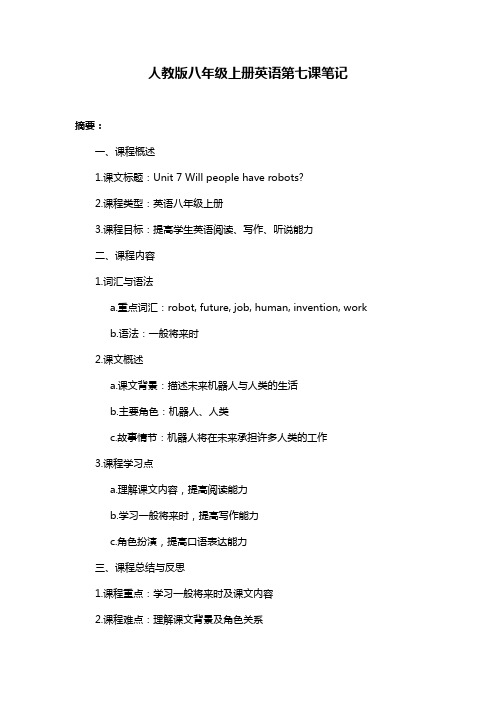
人教版八年级上册英语第七课笔记摘要:一、课程概述1.课文标题:Unit 7 Will people have robots?2.课程类型:英语八年级上册3.课程目标:提高学生英语阅读、写作、听说能力二、课程内容1.词汇与语法a.重点词汇:robot, future, job, human, invention, workb.语法:一般将来时2.课文概述a.课文背景:描述未来机器人与人类的生活b.主要角色:机器人、人类c.故事情节:机器人将在未来承担许多人类的工作3.课程学习点a.理解课文内容,提高阅读能力b.学习一般将来时,提高写作能力c.角色扮演,提高口语表达能力三、课程总结与反思1.课程重点:学习一般将来时及课文内容2.课程难点:理解课文背景及角色关系3.学习建议:多练习口语表达,结合实际生活场景运用所学知识正文:在我国人教版八年级上册的英语课程中,第七课的主题为“Unit 7 Will people have robots?”。
本课程旨在通过阅读、写作、听说等多种方式,帮助学生提高英语能力。
在课程中,首先学习了与主题相关的词汇与语法。
重点词汇包括robot (机器人)、future(未来)、job(工作)、human(人类)、invention(发明)和work(工作)。
语法方面,学生学习了如何使用一般将来时来描述未来的情况。
接下来,通过阅读课文,学生们对课程内容有了更深入的了解。
课文描述了一个未来的场景,在这个场景中,机器人将在各个领域承担许多人类的工作。
人类与机器人的关系成为本课的核心内容。
在学习过程中,学生们通过角色扮演等活动,提高了口语表达能力。
通过理解课文内容,学生们在阅读能力方面也得到了锻炼。
此外,学习一般将来时有助于提高学生的写作能力。
总的来说,本课程为学生提供了一个锻炼英语能力的平台。
在学习过程中,学生不仅需要理解课文内容,还要掌握语法知识和实际运用技能。
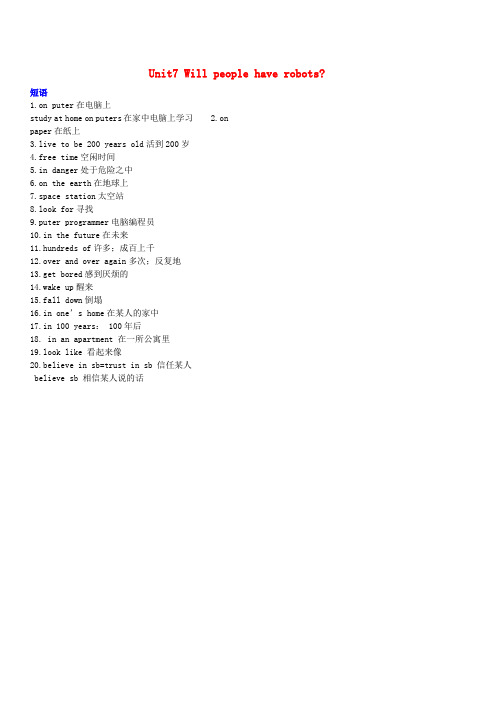
Unit7 Will people have robots?短语1.on puter在电脑上study at home on puters在家中电脑上学习 2.onpaper在纸上3.live to be 200 years old活到200岁4.free time空闲时间5.in danger处于危险之中6.on the earth在地球上7.space station太空站8.look for寻找9.puter programmer电脑编程员10.in the future在未来11.hundreds of许多;成百上千12.over and over again多次;反复地13.get bored感到厌烦的14.wake up醒来15.fall down倒塌16.in one’s home在某人的家中17.in 100 years: 100年后18. in an apartment 在一所公寓里19.look like 看起来像20.believe in sb=trust in sb 信任某人believe sb 相信某人说的话用法:1.will+动词原形将要做……2.fewer/more+可数名词复数更少/更多……less/more+不可数名词更少/更多……3.have to do sth.不得不做某事(客观) must 必须(主观)5.There will be + 主语+其他将会有……6.There is/are +sb./sth.+doing sth.有……正在做某事7.make sb. do sth. 8.help sb. with sth.帮助某人做某事9.What will the future be like ? 未来将会是什么样子?10.Which side do you agree with ?你同意哪一方的观点?。
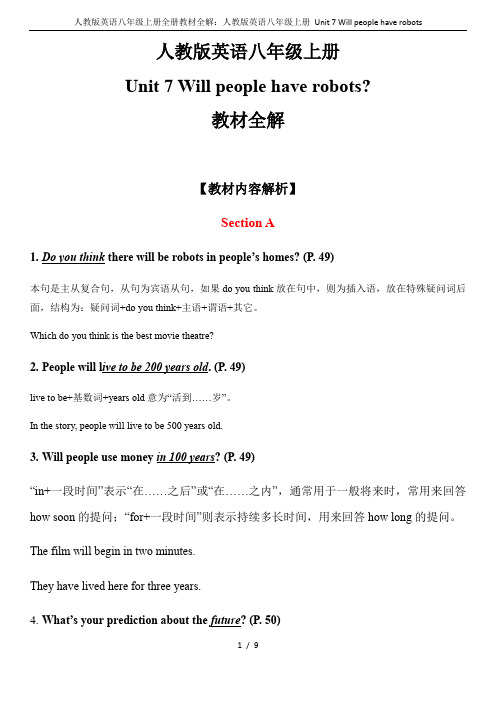
人教版英语八年级上册Unit 7 Will people have robots?教材全解【教材内容解析】Section A1.Do you think there will be robots in people’s homes? (P. 49)本句是主从复合句,从句为宾语从句,如果do you think放在句中,则为插入语,放在特殊疑问词后面,结构为:疑问词+do you think+主语+谓语+其它。
Which do you think is the best movie theatre?2.People will l ive to be 200 years old. (P. 49)live to be+基数词+years old意为“活到……岁”。
In the story, people will live to be 500 years old.3.Will people use money in 100 years? (P. 49)“in+一段时间”表示“在……之后”或“在……之内”,通常用于一般将来时,常用来回答how soon的提问;“for+一段时间”则表示持续多长时间,用来回答how long的提问。
The film will begin in two minutes.They have lived here for three years.4.What’s your prediction about the future?(P. 50)future作名词,表示“将来、未来”,in the future表示“在将来”。
Who knows what will happen in the future.5.I don’t think so.(P. 50)I don’t think so表示“我不这么认为”,肯定形式为I think so。
---Look at the cloud. It is going to rain.---I don’t think so. It will be sunny soon.【拓展】类似的结构还有:I hope so“我希望如此”,I hope not“我希望不是这样”,I’m afraid so“恐怕如此”,I’m afraid not“恐怕不是这样的”。
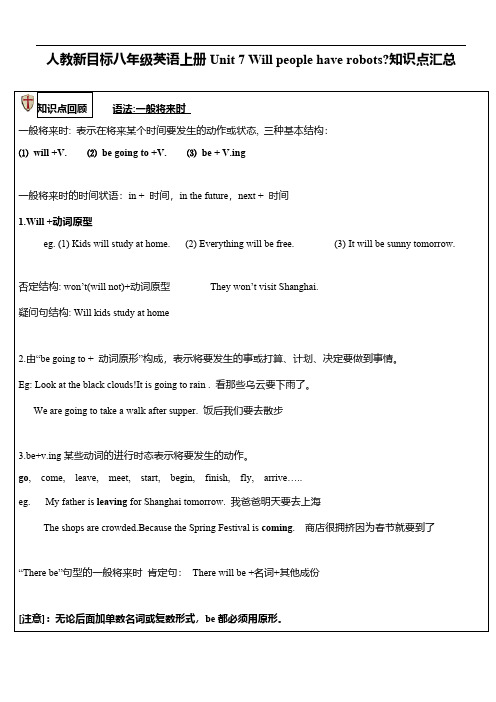
知识点回顾语法:一般将来时一般将来时: 表示在将来某个时间要发生的动作或状态, 三种基本结构:⑴will +V. ⑵be going to +V. ⑶be + V.ing一般将来时的时间状语:in + 时间,in the future,next + 时间1.Will +动词原型eg. (1) Kids will study at home. (2) Everything will be free. (3) It will be sunny tomorrow.否定结构: won’t(will not)+动词原型They won’t visit Shanghai.疑问句结构: Will kids study at home2.由“be going to + 动词原形”构成,表示将要发生的事或打算、计划、决定要做到事情。
Eg: Look at the black clouds!It is going to rain . 看那些乌云要下雨了。
We are going to take a walk after supper. 饭后我们要去散步3.be+v.ing某些动词的进行时态表示将要发生的动作。
go, come, leave, meet, start, begin, finish, fly, arrive…..eg. My father is leaving for Shanghai tomorrow. 我爸爸明天要去上海The shops are crowded.Because the Spring Festival is coming. 商店很拥挤因为春节就要到了“There be”句型的一般将来时肯定句:There will be +名词+其他成份[注意]:无论后面加单数名词或复数形式,be都必须用原形。
要点讲解Will there重点短语it will be difficult to do sth.不同意某人重点搭配重点短语Section A:1.play a part in saving the earth2.in 100 years3.on computers4.live to be….years old5.less free time6.world peace7.be free8.in great danger9.in the future10.move to other planetsSection B:1.fly rockets to the moon乘火箭到月球→fly up into the sky2.on a space station3.be able to…4.look for5.look like6.take a holiday7.the meaning of…..8.wake up….9.one day10.hundreds of11.over and over again12.do the same things as humans13.fall down14.seem impossible15. as a reporter语法聚焦----Will people use money----No, they won’t. Everything will be随堂练There ______a splendid football event(.I hope we'll study ______ home ______computers in the future.in;We should play a part in ______the party.organizingWe will have ______ free time next year than this year.Michael or Tony?______ ______ be a soccer match this weekend?.我们今天下午要为英语考试作准备。
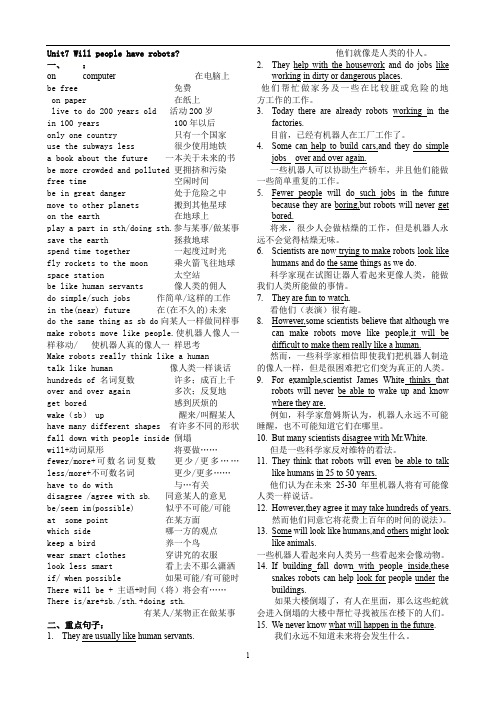
Unit7 Will people have robots?一、短语:on computer 在电脑上be free 免费on paper 在纸上live to do 200 years old 活动200岁in 100 years 100年以后only one country 只有一个国家use the subways less 很少使用地铁a book about the future 一本关于未来的书be more crowded and polluted 更拥挤和污染free time 空闲时间be in great danger 处于危险之中move to other planets 搬到其他星球on the earth 在地球上play a part in sth/doing sth.参与某事/做某事save the earth 拯救地球spend time together 一起度过时光fly rockets to the moon 乘火箭飞往地球space station 太空站be like human servants 像人类的佣人do simple/such jobs 作简单/这样的工作in the(near) future 在(在不久的)未来do the same thing as sb do向某人一样做同样事make robots move like people.使机器人像人一样移动/ 使机器人真的像人一样思考Make robots really think like a humantalk like human 像人类一样谈话hundreds of 名词复数许多;成百上千over and over again 多次;反复地get bored 感到厌烦的wake(sb) up 醒来/叫醒某人have many different shapes 有许多不同的形状fall down with people inside 倒塌will+动词原形将要做……fewer/more+可数名词复数更少/更多……less/more+不可数名词更少/更多……have to do with 与…有关disagree /agree with sb. 同意某人的意见be/seem im(possible) 似乎不可能/可能at some point 在某方面which side 哪一方的观点keep a bird 养一个鸟wear smart clothes 穿讲究的衣服look less smart 看上去不那么潇洒if/ when possible 如果可能/有可能时There will be + 主语+时间(将)将会有……There is/are+sb./sth.+doing sth.有某人/某物正在做某事二、重点句子:1.They are usually like human servants.他们就像是人类的仆人。

Unit 7 Will people have robots? (讲义) Words and expressionspaper /'peɪpə(r)/ n. 纸;纸张pollution /pə'luːʃn/ n. 污染;污染物prediction /prɪ'dɪkʃn/ n. 预言;预测future /'fjuːtʃə(r)/ n. 将来;未来pollute /pə'luːt/ v. 污染environment /ɪn'vaɪrənmənt/ n.环境planet/'plænɪt/ n. 行星earth /ɜː(r)θ/n. 地球;世界plant /plɑːnt/ v. 种植n. 植物part /pɑː(r)t/ n. 参加;参与;部分play a part 参与(某事)peace /piːs/ n. 和平sea /siː/ n. 海;海洋sky /skaɪ/ n. 天空astronaut /'æstrənɔːt/ n. 宇航员;航天员apartment /ə'pɑː(r)tmənt/ n. 公寓套房rocket /'rɒkɪt/ n. 火箭space /speɪs/ n. 太空;空间space station 太空站;宇宙空间站human /'hjuːmən/ adj. 人的n. 人servant /'sɜː(r)vənt/ n. 仆人dangerous /'deɪndʒərəs/ adj. 有危险的;不安全的already /ɔːl'redi/ adv.已经;早已factory /'fæktəri/ n. 工厂over and over again 多次;反复地believe /bɪ'liːv/ v.相信;认为有可能disagree /,dɪsə'griː/ v.不同意;持不同意见;有分歧even /'iːvn/ adv.甚至;连;愈加hundreds of 许多;大量shape /ʃeɪp/ n. 形状;外形fall /fɔːl/ v. (fell /fel/) 倒塌;跌倒;掉落fall down 突然倒下;跌倒;倒塌inside /ɪn'saɪd/ adv. & prep. 在……里面look for 寻找;寻求possible /'pɒsəbl/ adj. 可能存在或发生的;可能的impossible /ɪm'pɒsəbl/ adj. 不可能存在或发生的;不可能的side /saɪd/ n. 一方(的意见、态度、立场)probably /'prɒbəbli/ adv.很可能;大概during /'djʊərɪŋ/ prep. 在……期间holiday /'hɒlədeɪ/ n. 假期;假日word /wɜː(r)d/ n. 单词;词Nick /nɪk/ 尼克(男名)James /dʒeɪmz/ 詹姆斯(男名)White /waɪt/ 怀特(姓)Role-playNick: What are you reading, Jill?Jill: It’s a book about the future.Nick: Sounds cool. So what will the future be like?Jill: Well, cities will be more crowded and polluted. There will be fewer trees and the environment will be in great danger. Nick: That sounds bad! Will we have to move to other planets? Jill: Maybe. But I want to live on the earth.Nick: Me, too. Then what can we do?Jill: We can use less water and plant more trees. Everyone should play a part in saving the earth.Grammar focus’ll=willwon’t=will not3a Fill in the blanks with more, less or fewer.1.In the future, there will be fresh water because there will bepollution in the sea.2.In 100 years, there will be cars because there will bepeople in the cities.3.There will be jobs for people because robotswill do the same jobs as people.4.I think there will be cities because people will buildbuildings in the country.5.In 50 years, people will have free time because therewill be things to do.Reading2b Read the article and match each paragraph with the questionsit discusses.Paragraph 1 Will robots think like humans in thefuture? Paragraph 2 What will robots be like in the future? Paragraph 3 What can robots do today?Paragraph 4 What are robots like in movies?Do You Think You Will Have Your Own Robot?1.When we watch movies about the future, we sometimes see robots. Theyare usually like human servants. They help with the housework and do jobs like working in dirty or dangerous places.2.Today there are already robots working in factories. Some can helpto build cars, and they do simple jobs over and over again. Fewer people will do such jobs in the future because they are boring, but robots will never get bored.3.Scientists are now trying to make robots look like humans and dothe same things as we do. Some robots in Japan can walk and dance.They are fun to watch. However, some scientists believe that although we can make robots move like people, it will be difficult to make them really think like a human. For example, scientist James White thinks that robots will never be able to wake up and know where they are. But many scientists disagree with Mr. White. They think that robots will even be able to talk like humans in 25 to 50 years.4.Some scientists believe that there will be more robots in the future.However, they agree it may take hundreds of years. These new robots will have many different shapes. Some will looks like humans, and others might look like animals. In India, for example, scientists made robots that look like snakes. If buildings fall down with people inside, these snake robots can help look for people under thebuildings. This was not possible 20 years ago, but computers and rockets also seemed impossible 100 years ago. We never know what will happen in the future!Exercises一、填空1.Our (环境) will be better if we protect it.2.The (预言) didn’t come true.3.His uncle is an (宇航员).4.He worked in a (太空站) last year.5.There are five (仆人) in his family.6.Tom was surprised by all the (pollute) on the beach.7.We hope the world will be (peace).8.Be away from the tiger. It’s(danger).9.It’s too late. I (agree) that we go there today.10.It seems (possible) that people can fly.二、单选( )11. Please pass me two .A.pieces of paperB. pieces of papersC. pieces paperD. piece papers( )12. Let’s play a part the room.A. cleanB. cleaningC. to cleanD. in cleaning( )13. volunteers will give out leaflets(传单) to ask people to protect the wetlands(湿地).A. Two hundredsB. Hundreds ofC. Two hundred ofD. Hundred of( )14. , Tom! It’s time to get up and go to school.A. Wake upB. Make upC. Grow upD. Look up ()15. John will go to France on vacation this summer.A. possibleB. impossibleC. probablyD. probable( )16. It is difficult for a robot _ thesame things aperson does.A. doing; likeB. do; fromC. to do; asD. does; as( )17. —What are you doing in the room?—I’m my hat.A. looking afterB. looking forC. looking upD. looking like( )18. There are some students the classroom.A. cleanB. to cleaningC. cleaningD. cleans( )19. There are many clouds _ the sky.A. inB. onC. atD. to( )20. I think the movie is interesting. But he disagrees me.A. inB. withC. toD. of( )21. It’s7 p.m., but the children are not backyet.A. alsoB. eitherC. alreadyD. only( )22. If there are people driving, there will be _air pollution.A. less; lessB. less; fewerC. fewer; fewerD. fewer;less( )23. —Willthere be schools in the future?—I think students will study at home on the Internet.A. Yes, there will.B. No, there won’t.C. Yes, there is.D. No, there isn’t.三、翻译24.你同意将来会有更多的污染吗?Do you that there will be more pollution?25.你能告诉我未来是什么样子吗?Can you tell me what the ? 26.你必须反复地练习才能做得很好。

Unit 7 Will people have robots?词汇精讲1. duringduring是介词,意为“在……期间”。
例如:I went to see my uncle during my stay in Beijing. 我在北京逗留期间去北京看我叔叔了。
【拓展】during;in与for(1) during指“在……时间内,在……的期间”。
谓语动词常为表示持续性的动作或状态的动词,时间段前常有限定词(the; 物主代词等),表特指。
例如:He asked many questions during the three meetings.在这三次会议期间,他问了许多问题。
(2) in意为“在……时间内”,一般情况下可以和during互换,用in时往往强调某一动作发生在某一时间段中的某一时间点;during既可表示“在整个时间段期间”,也可表示“某时间段内的某个时间点”。
例如:Mike put his hand up three times during/in the class.在这节课内,Mike举了三次手。
(3) for意为“(时间)长达……”,强调时间由始至终,动作也贯穿这段时间的始终,可以和完成时连用。
强调持续时间的长短,回答how long的提问;而during则是指动作所发生的时间,回答when的提问。
例如:He stayed in Beijing for two years. 他在北京住了两年。
He swims every day during the summer. 夏天他每天去游泳。
2. in 100 yearsin 100 years意为“100年之后”,是由“介词in + 一段时间”构成,表示“在……之后”,多用于一般将来时。
对此短语提问时常用how soon。
例如:I will finish the task in two hours.我将在两个小时后完成这项任务。

姓名:班级Unit 7 Will people have robots?Section A本课重点1.will构成的一般将来时态的肯定句、否定句、一般疑问句及回答2.做预言,用will来讨论未来发生的事情3.用will来表达将来时,并能熟练运用there be 句型表达将来时4.明确区分可数名词和不可数名词;正确使用more,less,fewer 本课难点1.用will来表达将来时,并能熟练运用there be句型表达将来时2.明确区分可数名词和不可数名词;正确使用more,less,fewer 常考句型 1.Kids won't go to school. They will study at home on computers.2.People will live to be 200 years old.3.—Will people use money in 100 years?—No,they won't. Everything will be free.4.I think there will be more pollution.5.I don't think so.I think there will be fewer trees.6.It's a book about future.7.What will the future be like?8.Will we have to move to other planets?9.Everyone should play a part in saving the earth.一、单项选择1.Lingling and I __________ to Lao She Teahouse last night.A.go B.are going C.went D.will go2.There _______ a football match on TV this evening.A.will have B.will be C.has D.is going to have 3.—What's your aunt's plan for tomorrow?—She _________ to the theatre to see the Beijing Opera.A.go B.will go C.went D.goes4.When the rain ________, we’ll go home at once. But no one knows when the rain ________. A.stops; stops B.will stop; will stopC.stops; will stop D.will stop; stops5.If we do nothing to protect giant pandas, there ________ no more giant pandas in the future. A.will have B.will has C.will be D.will be going to have 6.—Will you go to the cinema with me tomorrow?—Sorry, I _____ skating with Tom.A.go B.goes C.went D.will go7.What will the future ________ like?A.is B.are C.am D.be8.— Will there be more schools in 20 years’ time?—________. I think students will study by Internet at home.A.No, there aren’t B.Yes, there are C.No, there won’t D.Yes, there will 9.The air ________ here makes me uncomfortable.A.discussion B.relationship C.pollution D.information 10.——How soon will he come back? ——___________ two days.A.Before B.After C.In D.For二、用所给词的适当形式填空。

八年级英语上册 Unit 7 Will people have robots?(第2课时)说课稿一. 教材分析《八年级英语上册》Unit 7 “Will people have robots?” 是人教版新目标英语教材的一个单元。
本单元主要围绕未来科技的发展,特别是机器人在日常生活中的应用进行讲解。
通过本单元的学习,学生可以掌握一般将来时的被动语态,提高自己的听说读写能力,并激发他们对未来科技的想象和思考。
二. 学情分析八年级的学生已经掌握了英语学习的基本语法和词汇,具备一定的听说读写能力。
他们对新科技充满好奇,善于接受新鲜事物,但同时也可能对一些抽象的概念和语言表达感到困惑。
因此,在教学过程中,我们需要关注学生的个体差异,因材施教,激发他们的学习兴趣和积极性。
三. 说教学目标根据《义务教育英语课程标准》和教材内容,本节课的教学目标如下:1.知识目标:学生能够掌握一般将来时的被动语态,理解与未来科技相关的词汇和表达。
2.能力目标:学生能够在真实情境中运用所学知识进行交流,提高听说读写能力。
3.情感目标:激发学生对未来的想象和思考,培养他们对科技发展的积极态度。
四. 说教学重难点1.教学重点:学生能够熟练运用一般将来时的被动语态进行表达。
2.教学难点:学生能够准确理解与未来科技相关的词汇和表达,以及在真实情境中运用所学知识进行交流。
五. 说教学方法与手段本节课采用任务型教学法,结合情境教学法和分组合作学习法,利用多媒体教学手段,激发学生的学习兴趣,提高他们的参与度和积极性。
六. 说教学过程1.导入:通过展示一段关于未来科技的短片,引发学生对未来的想象,激发他们的学习兴趣。
2.呈现:教师通过PPT展示本节课的主要内容,引导学生关注一般将来时的被动语态和与未来科技相关的词汇。
3.操练:学生分组进行角色扮演,运用所学知识进行对话,教师给予指导和反馈。
4.巩固:学生完成一组有关未来科技的练习题,检测他们对知识的掌握程度。

Unit 7 Will people have robots?(Section A 1a-2c)一、教材分析:(一)、本节教材的地位和作用本课是新目标英语八年级上册的第七单元的Section A 的第一部分,本节教材所涉及内容在中考中占有相当重要的地位。
本节教材围绕着“将来发生的事”展开,要求学生学习和运用“will+v(原)”构成的一般将来时态。
本课教学内容与学生的实际生活相关,可以利用学生的想象,引导学生运用简单的英语来描述将来的生活和事物。
在学习活动中,学生通过对将来发生的事情的描述,促进学生对美好未来的憧憬。
(二)、教学目标:(1)知识与技能1.指导学生学习有关将来要发生的事情的表达及语法知识点“一般将来时” 。
2.培养学生的口头表达能力、阅读理解能力和写作能力。
1. 学习有关的单词及词组:robot, paper, pollution, tree, subway, computer, will, won ’ t ,they’ll, fewer, be free, on paper, live to be, in 100 years, etc. 2. 学习重要句型:(1)People will have robots in their homes. (2)Will people have robots?. (3)Kids won’ t go to school. (4) There will be less pollution. 3. 掌握语法点:The Simple Future Tense ( 一般将来时) (1)教师自制的多媒体课件;(2)上课环境为多环境。
(2)情感目标:通过学生对自己in five years 的展望,设想自己五年,十年,甚至是二十年后的生活,贴近学生生活实际,符合学生好奇的心理,激发学生浓厚的学习兴趣。
(3) 学习策略:通过任务型的教学,让学生学会自主学习,归纳总结,培养主动学习的能力。
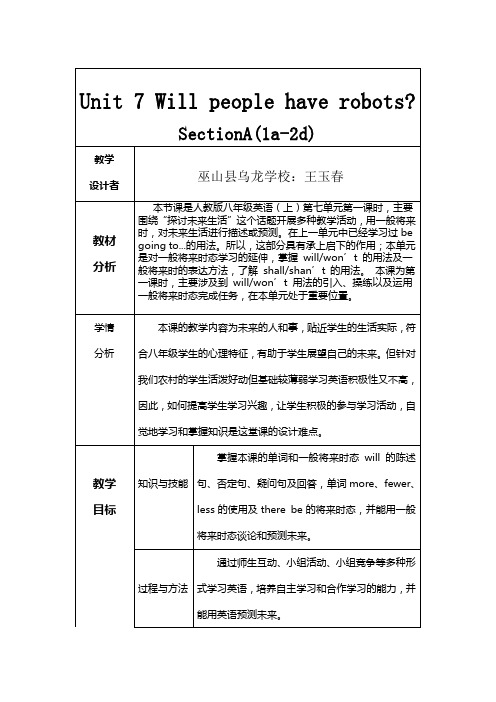

人教版英语八年级上册Unit 7 Will people have robots?教材全解【教材内容解析】Section A1.Do you think there will be robots in people’s homes? (P. 49)本句是主从复合句,从句为宾语从句,如果do you think放在句中,则为插入语,放在特殊疑问词后面,结构为:疑问词+do you think+主语+谓语+其它。
Which do you think is the best movie theatre?2.People will l ive to be 200 years old. (P. 49)live to be+基数词+years old意为“活到……岁”。
In the story, people will live to be 500 years old.3.Will people use money in 100 years? (P. 49)“in+一段时间”表示“在……之后”或“在……之内”,通常用于一般将来时,常用来回答how soon的提问;“for+一段时间”则表示持续多长时间,用来回答how long的提问。
The film will begin in two minutes.They have lived here for three years.4.What’s your prediction about the future?(P. 50)future作名词,表示“将来、未来”,in the future表示“在将来”。
Who knows what will happen in the future.5.I don’t think so.(P. 50)I don’t think so表示“我不这么认为”,肯定形式为I think so。
---Look at the cloud. It is going to rain.---I don’t think so. It will be sunny soon.【拓展】类似的结构还有:I hope so“我希望如此”,I hope not“我希望不是这样”,I’m afraid so“恐怕如此”,I’m afraid not“恐怕不是这样的”。

初中英语学习资料madeofjingetiejiUNIT 7Will people have robots?检测题( 本检测题满分:100 分,时间: 60 分钟 )一、听力部分(满分 20 分)Ⅰ . 听句子,选择与你所听到的句子内容吻合的图片。
每个句子读一遍。
(每题 1 分,满分 5分)A . B. C. D. E.1._______2. _______3. _______4. _______5. _______II.听句子,选择你所听到句子的最正确答语。
每个句子读一遍。
(每题1 分,满分 5 分)6.A. Because I had to go to school. B. Did you stay at home, too?C. Because my mother was ill.7.A. They were delicious.8.A. Yes, I did.9.A. It’ syuanfifty .10.A. Yes, I ’ d like some apples. C.No, I don ’ t need your help. B. They were friendly.B. No, you didn’ t.B. It’ s, 100 yuan.B. Yes, I can.C. They are fine.C. Yes, I do.C. It’ s not cheap.III.听下面五组对话,选择正确答案。
每组对话读两遍。
(每题 1 分,满分 5 分)11.What is the weather like tomorrow?A. It will be sunny.B. It will be windy.C. It will be rainy.12.How does the man go to work?A. By bike.B. On foot.C. By car.13.What does Tony want to be when he grows up?A. A worker.B. A teacher.C. A reporter.14.What’ s Jack doing?A.He is playing with snow.B.He is walking in the rain.C.He is running in the wind.15.What will the family buy?A. A telephone.B. A television.C. A computer.Ⅳ . 听短文 , 选择最正确答案。
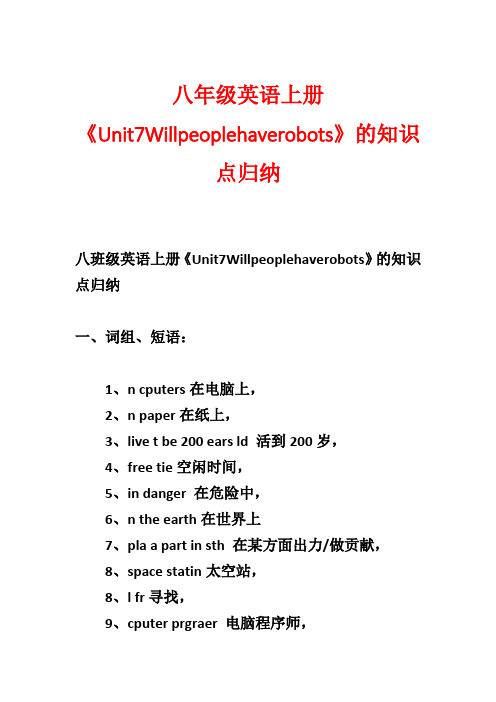
八年级英语上册《Unit7Willpeoplehaverobots》的知识点归纳八班级英语上册《Unit7Willpeoplehaverobots》的知识点归纳一、词组、短语:1、n cputers在电脑上,2、n paper在纸上,3、live t be 200 ears ld 活到200岁,4、free tie空闲时间,5、in danger 在危险中,6、n the earth在世界上7、pla a part in sth 在某方面出力/做贡献,8、space statin太空站,8、l fr寻找,9、cputer prgraer 电脑程序师,10、in the future 在将来,11、hundreds f成百上千的.,12、the sae…as与…一样,13、ver and ver again 反复,14、get bred 无聊,abe/perhaps 用于句首。
Mabe/Perhaps u are right.1. during / fr / in 介词,在……期间。
说到某事是在某一段时间之间发生的用during; 说到某事持续多久则用fr; 说到某事具体发生的时间用in.We visited an places f interest during the suer hlida.I’ve been here fr tw we es.The usuall leave schl in ul.一般将来时结构:肯定式:主语+ will/shall + 动词原形+ 其他will 用于各种人称,shall 用于第一人称。
主语+ be ging t + 动词原形+ 其他be 随人称、数和时间的变化而变换。
否定式:在will/shall/be 后面加nt. will nt = wn’t .一般疑问句:将will/shall/be 提到主语前面。
There be 句型的一般将来时:There will be + 主语+ 其他,意为:将会有。

Unit7 Will people have robots?试讲稿Section A (1a 1b 1c)教学过程:(Warming up and leading in)T: Good morning every one, how are you today?S: Fine, thank you! How are you?T: I am fine, too, sit down please.T: Boys and girls, what do you want to be when you grow up?S1: I want to be a scientist.T: Wow, that’s cool, how are you going to do that?S1: I’m going to study science hard. T: very well, sit down, please.T: What about you, Jim?J: I want to be a professional basketball player.T: I hope you dream could come true.T: You have told me your plans, but how will the world be different in the future, can you make some predictions?S: May be a lot of robots.T: Good! Let’s look at what we are going to learn today. (Write down the title) (Presentation and Practice)T: How old are you Lucy? L: I am 14 years old.T: ok, look at this time line, what about two years later?L: 16 years old!T: Good, we can also say“I will be 16 years old in two years,”could you follow me?L:I will be 16 years old in two years.T: yes! Now, let’s talk about what the future will be. T: will books only be on computer?S1: yes, they will. S2: No, they don’t.T: Oh, it is better to say“they will not”,“books won’t be only on computer”.S2: Ok, I got it.T: now you can discuss in pairs to finish 1a on page 49, am I clear? T: who want to tell us your result?S3: I think people will have robots in their homes, and people won’t use money, everything will be free.T: excellent! Now let’s look at the pictures and read the sentences together, are you ready? Go! T: boys read, girls!T: you are super.T: May be you are a little tired after reading. Now please close your mouths and open your ears,let’s listen to the tape and finish 1b.T:Green,could you tell us what you hear?G:1, 2, 4, 5T:Is he correct?S:Yes,he is.(Consolidation)T: do you want to be a artist? Please work in groups to make predictions with the sentences in 1C and drawing them down. You can add other sentences if you like, I will give you 5minites.T: Ok, time is up. Which group wants to show their future life?S4: In our picture, people won’t use money in 100 years, and there will be only one country, called“Human United States”.T: Great!Let’s give this group a big hand!(Summary)T: Boys and girls look at the blackboard again, and who can tell me what we have learned today? S: Today we learned to predict future things.T: Yes! And we learned to express “will be”right? Do you remember, let’s read them again. T: I’d like to give you a gift because you are very active today.T: Ok, today’s homework for you is to write a short passage with the title“the future life”. we will talk about it next class. I will say this again…Are you clear?S: yes!T: Well, class is over, goodbye! S: Good-bye teacher!(板书设计)课堂追问:1. 本节课的教学重点是什么?【参考答案】学习掌握一般将来时态的意义和结构。